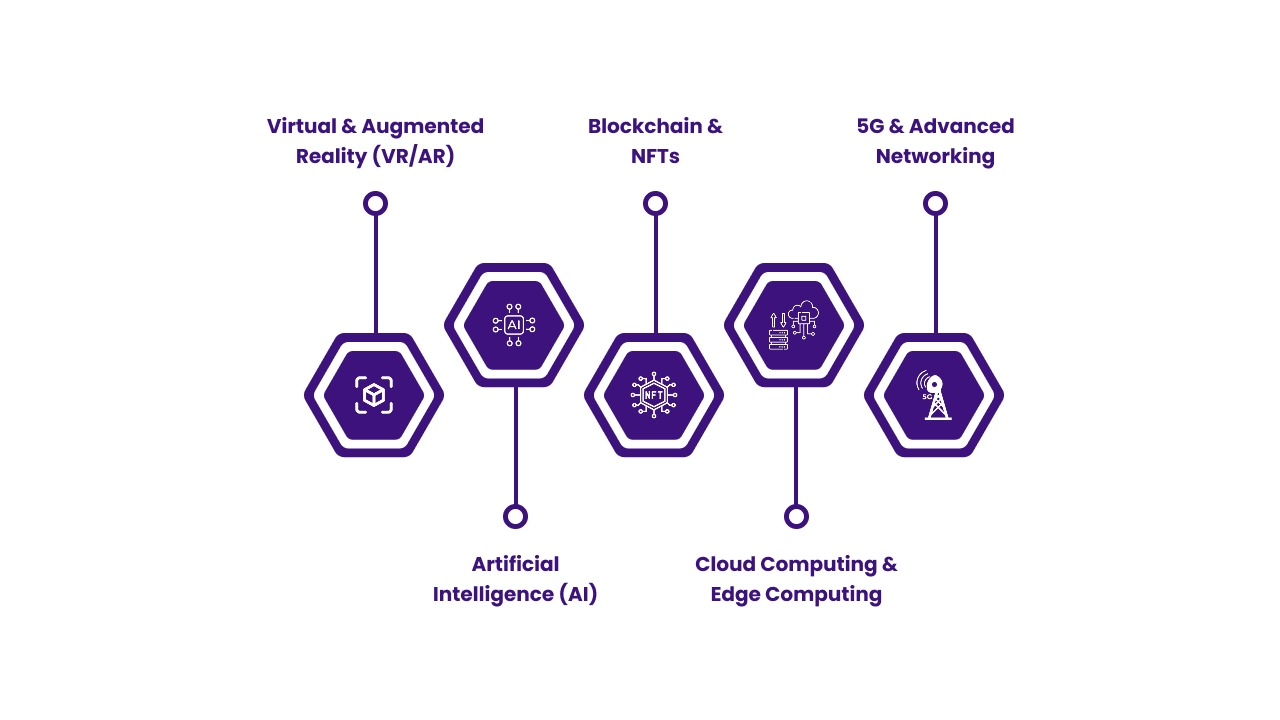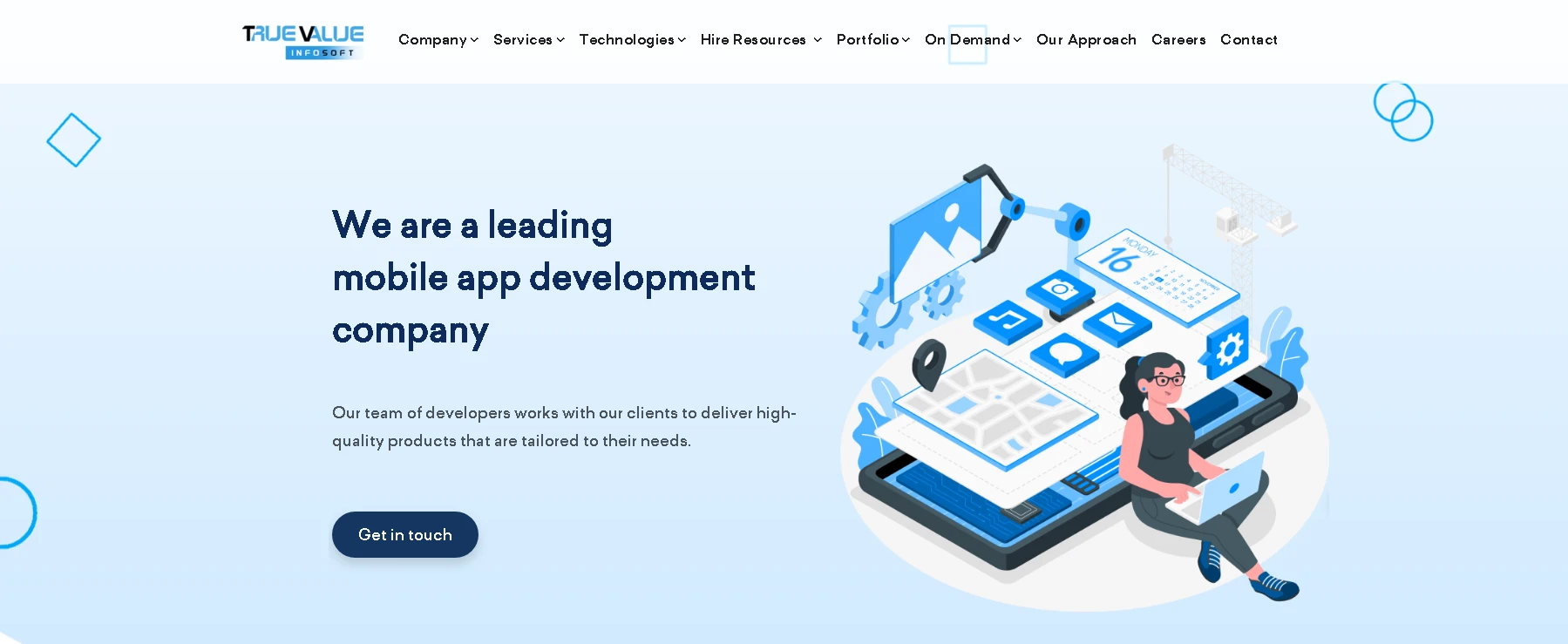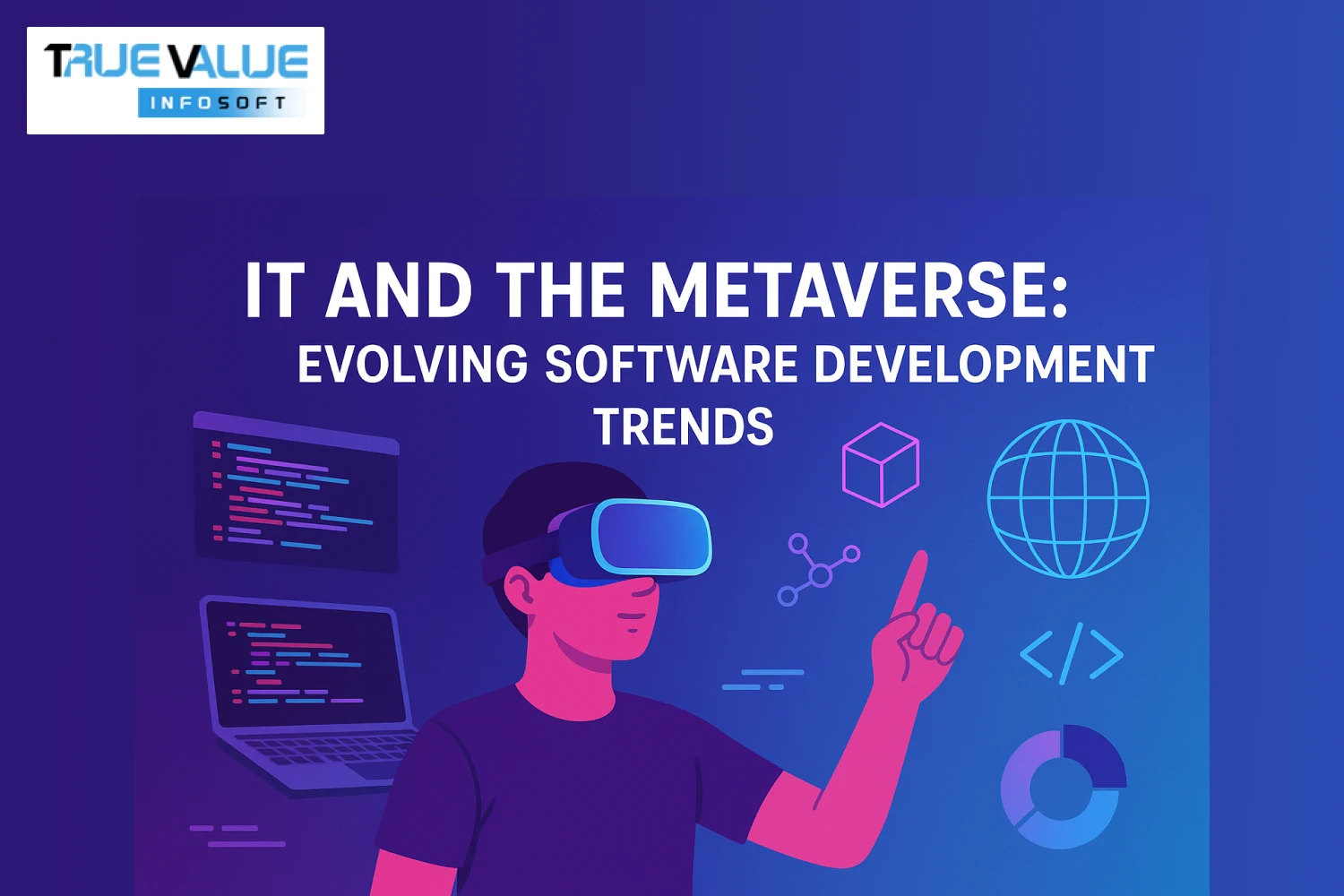Introduction
Have you ever wondered how the metaverse is transforming the IT landscape? As we move towards an increasingly digital world, businesses and developers must adapt to the revolutionary changes brought by the metaverse. True Value Infosoft, App Development Company, is at the forefront of this transformation, providing cutting-edge software solutions that redefine virtual experiences.
The metaverse, a convergence of virtual reality (VR), augmented reality (AR), artificial intelligence (AI), and blockchain, is creating new opportunities and challenges for IT professionals. As more industries embrace this immersive digital realm, software development is evolving to meet the growing demand for seamless, interactive, and secure applications. In this article, we will explore how IT companies like True Value Infosoft are adapting to the metaverse revolution and why they remain the top choice for software development in India.
Mobile app development company in India
Understanding the Metaverse: A Digital Revolution
The term "metaverse" refers to a collective virtual shared space created by the convergence of virtually enhanced physical reality and persistent virtual worlds. It includes technologies like virtual reality (VR), augmented reality (AR), artificial intelligence (AI), blockchain, and cloud computing.
Key Components of the Metaverse

- Virtual & Augmented Reality (VR/AR): Provides immersive experiences for users.
- Artificial Intelligence (AI): Enhances interactions, personalization, and automation.
- Blockchain & NFTs: Enable digital ownership, transactions, and decentralized governance.
- Cloud Computing & Edge Computing: Support scalable and real-time interactions.
- 5G & Advanced Networking: Facilitate seamless connectivity and high-speed data transfer.
The development of the metaverse is leading IT professionals and software developers to rethink traditional applications, architectures, and user interfaces to support persistent digital worlds.
1. New Programming Languages & Frameworks
The metaverse requires programming languages that support real-time rendering, 3D interactions, and blockchain functionality. Some of the key languages and frameworks include:
- C# & C++: Commonly used for game engines like Unity and Unreal Engine.
- JavaScript & WebXR: Power web-based VR and AR experiences.
- Python & AI Libraries: Essential for AI-driven virtual environments.
- Solidity & Rust: Used for blockchain and smart contract development.
2. Metaverse Software Development Kits (SDKs) & Tools
Developers now have access to powerful tools that make building metaverse applications more accessible:
- Unity & Unreal Engine: Leading engines for creating immersive 3D environments.
- Meta Spark & ARKit/ARCore: Enable AR experiences on mobile devices.
- OpenXR: A standard API for cross-platform VR and AR development.
- Ethereum & Polygon SDKs: Facilitate blockchain integration and NFT support.
3. Cloud Computing & Edge Computing for Scalable Experiences
The metaverse requires vast computational resources to run immersive virtual worlds. Cloud computing, in combination with edge computing, ensures smooth experiences by reducing latency and improving performance. Services like AWS, Microsoft Azure, and Google Cloud are adapting their offerings to support metaverse-based applications.
4. Cybersecurity Challenges in the Metaverse
With the expansion of digital identities, blockchain transactions, and virtual assets, security concerns have become paramount. Developers must integrate:
- Decentralized Identity (DID) for secure authentication.
- End-to-End Encryption for communication and transactions.
- AI-driven Fraud Detection to prevent scams and data breaches.
5. User Experience (UX) & Human-Computer Interaction (HCI) in the Metaverse
Developers need to design intuitive, accessible, and inclusive virtual experiences. Innovations in HCI include:
- Haptic Feedback & Wearable Devices for realistic interactions.
- AI-driven Virtual Assistants for user navigation.
- Adaptive Interfaces for users with disabilities.
The Future of IT & Software Development in the Metaverse
1. Rise of Decentralized Applications (dApps)
The metaverse is encouraging a shift from centralized applications to decentralized applications (dApps) powered by blockchain technology. This transition is leading to more transparent, secure, and user-controlled digital environments.
2. Cross-Platform Development & Interoperability
Interoperability between different metaverse platforms is essential for a seamless user experience. Developers are working on standards that allow virtual assets, identities, and environments to be accessible across multiple platforms.
3. AI & Machine Learning in the Metaverse
AI is playing a crucial role in the metaverse by:
- Generating Realistic NPCs (Non-Player Characters).
- Personalizing User Experiences.
- Enhancing Content Creation Through Generative AI.
4. Integration of IoT & Smart Devices
The metaverse will connect with the Internet of Things (IoT), allowing real-world devices to interact with virtual environments. This will enable smart homes, industries, and cities to integrate with digital twins in the metaverse.
5. Ethical & Regulatory Considerations
With increasing digital interactions, ethical concerns such as data privacy, digital rights, and content moderation are gaining attention. Governments and organizations are working on frameworks to regulate metaverse interactions.
Why True Value Infosoft is the Best IT App Development Company in India

True Value Infosoft stands out in the IT industry due to its commitment to innovation, quality, and customer satisfaction. The company specializes in cutting-edge software development, including metaverse applications, AI-powered platforms, and blockchain solutions. Here’s why True Value Infosoft is the best IT app development company in India:
- Expert Team: A highly skilled team of developers, designers, and engineers ensures top-quality software solutions tailored to client needs.
- Innovation & Technology: The company stays ahead of industry trends by integrating the latest technologies, including AI, blockchain, and cloud computing.
- Scalability & Security: True Value Infosoft prioritizes secure, scalable, and high-performance applications that help businesses grow.
- Client-Centric Approach: A strong focus on customer satisfaction ensures that each project is aligned with the client’s vision and business goals.
- Diverse Industry Experience: The company has extensive experience in healthcare, finance, e-commerce, education, and other sectors, delivering customized solutions for various industries.
- Timely Delivery & Cost-Effectiveness: Projects are completed within deadlines without compromising on quality, ensuring cost-effective solutions for businesses of all sizes.
Conclusion
The metaverse is reshaping the landscape of IT and software development, creating opportunities and challenges for developers worldwide. By embracing new programming languages, leveraging AI and blockchain, and prioritizing security and user experience, software developers can play a crucial role in shaping the future of this digital revolution.
As the metaverse continues to evolve, staying informed about emerging technologies and best practices will be essential for developers looking to build the next generation of immersive digital experiences. The convergence of IT and the metaverse is not just a trend—it’s the future of the digital world.
FAQs
C++, C#, JavaScript, Python, Solidity, and Rust are commonly used in metaverse development.
Blockchain enables digital ownership, decentralized governance, and secure transactions through NFTs and smart contracts.
AI enhances user interactions, generates realistic virtual environments, and provides automation for personalized experiences.
Challenges include interoperability, cybersecurity, high computational demands, and ethical concerns related to digital privacy.
Businesses can use the metaverse for virtual workspaces, e-commerce, gaming, digital marketing, and customer engagement.





